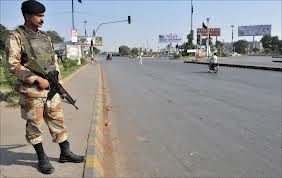
(Credit: centralasiaonline.com)
Small wonder that MQM chief, Altaf Hussain – who fled to London under Prime Minister Nawaz Sharif’s first tenure – has denounced the ongoing operation in Sindh as a reminder of the “genocide of Mohajirs” suffered in 1992 under ‘Operation Clean up.’ In so doing, he has appealed to third and fourth generation of Mohajirs, whose fathers may have been killed during that decade in police encounters and extrajudicial killings.
Apparently, the MQM miscalculated when it invited the army to conduct the operation. The first sign that the operation was not to their liking, came, when it’s former MPA, Nadeem Hashmi was arrested for the murder of two policemen – and the party protested by shutting down Karachi and a few urban areas in Sindh. Hashmi’s sudden release from an anti-terrorist court would show the MQM still has political leverage.
But essentially, US plans to withdraw from Afghanistan and the election of a `Taliban friendly,’ government have contributed to the MQM’s woes. In the wake of 9/11, the party reinvented itself as the secular alternative to `Talibanization.’ However, given that the Mohajir-Pashtun conflict is ethnic in nature, the MQM went on a limb to prevent the `Pashtoonization’ of Karachi. As violence erupted in Karachi, it prevented ever migrating Pashtuns from settling there.
After 9/11, US support for Gen. Pervaiz Musharraf facilitated him to patronize the MQM – allowing the ethnic party to reach its hey day. It contributed to the longest tenure for MQM’s Ishrat ul Ebad to govern Sindh – notwithstanding the murder and army kidnapping cases lodged against him in 1992. Former president, Asif Zardari, learning from the rocky tenures of his prime minister-wife, Benazir Bhutto, molly-coddled the MQM – enabling the PPP government to complete its tenure.
The downside was that for the last five years, the MQM and the Awami National Party (representing Pushtoons) fought on ethnic basis for the control of Karachi. The PPP, saved its coalition with the two parties by desisting from action against politically affiliated criminals. Adopting the maxim `If you can’t beat them, join them,’ it patronized armed Baloch groups from Lyari to keep control.
While the PPP government abdicated power, the land mafia dug in and brutal Taliban elements entered Karachi. Murders sky rocketed and extortion, kidnappings for ransom, vehicle thefts and mobile phone snatching soared. All this happened as the US presence in Afghanistan made weapons more accessible than ever. It resulted in 7,000 people being killed in the city in the last five years alone.
Given that Karachi is the back-bone of the nation’s tax base, the business minded Sharif government has focused on returning peace to the city. Senior police officers have been transferred and Rangers deputed to crack down in Karachi. The PPP, now acting as a junior partner of Sharif’s government, coyly says it needs to act against all criminal elements, regardless of party affiliation.
However, the absence of justice in Pakistan’s political system makes the MQM woefully aware that its real “crime,” is being out of power!!
For example, Scotland Yard has only now reinvigorated the three-year-old murder case of Imran Farooq – that implicates MQM chief Altaf Hussain. As Altaf’s demi-God personality comes under challenge, his followers have passionately rallied around him in a `now or never’ battle for survival. Media reports nevertheless, talk about cracks within the MQM – among those who support Ebad’s governorship, and others who want to stay in opposition.
At the end of the day, Sindh seeks an even-handed operation that will rid the province of all criminal elements – regardless of patronage. Presently, the culture of nepotism and absence of just policies keeps people coalescing around ethnicity. In the urban areas – and a mega city like Karachi, it fans a culture of violence that promotes fear and intimidation.
Today the biggest stake holders of Sindh – Sindhis and Mohajirs – need to rid themselves of ethnic prejudices and work together to promote rational policies and good governance. That means taking a lesson from developed nations – where race, ethnicity religion, sect and gender can no longer be used to discriminate and obstruct the common good.
